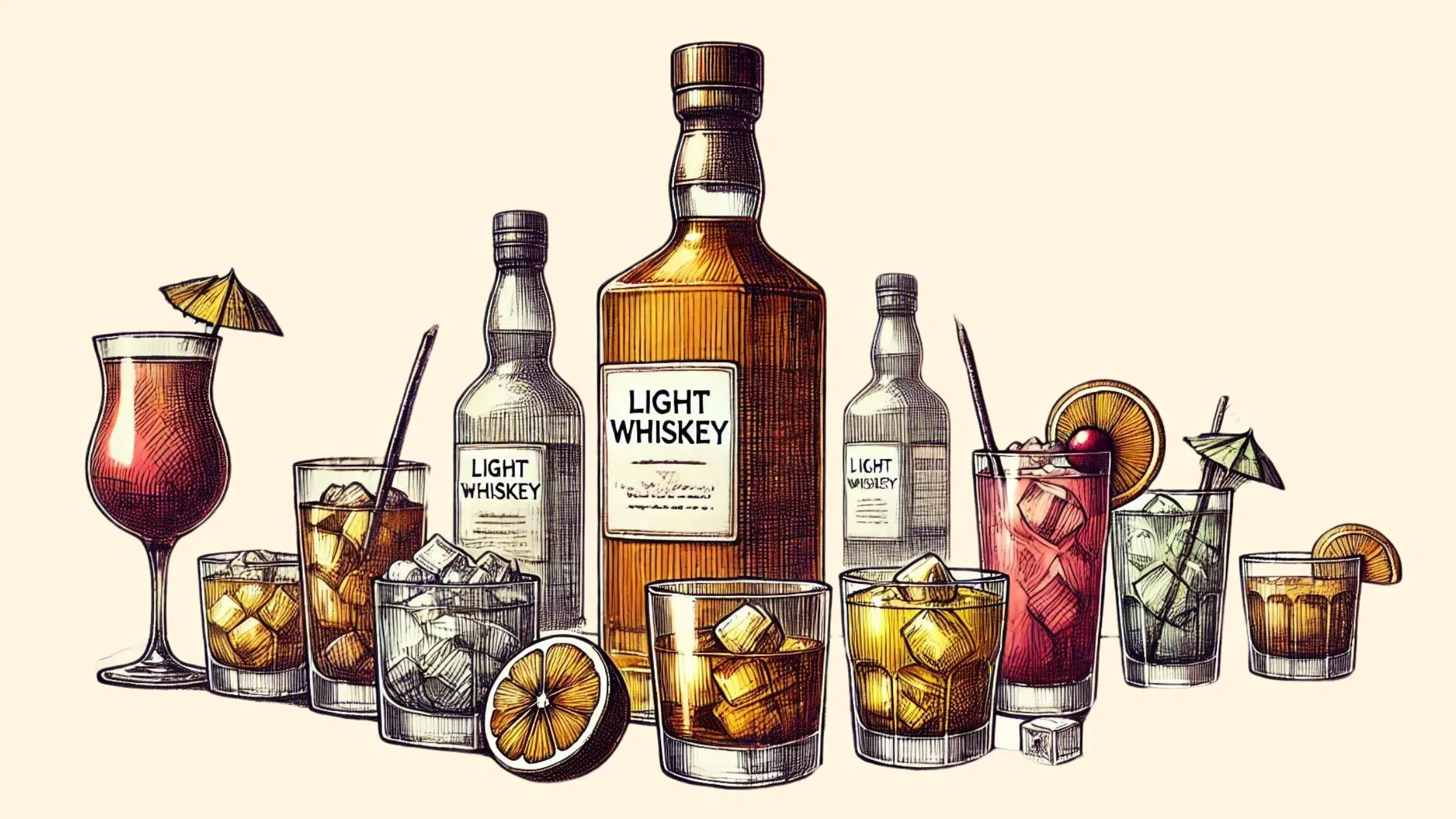If you’ve ever found yourself intrigued by the smoother, subtler side of whiskey, then light whiskey might just be your next favorite sip. This lesser-known category offers a unique twist on the traditional whiskey experience, boasting a lighter body and a more neutral flavor profile that makes it perfect for mixing. Whether you’re a seasoned whiskey aficionado or a curious newcomer, the world of light whiskey presents an exciting playground for taste exploration.
From the classic simplicity of water to the fizzy fun of club soda, and the spicy sweetness of ginger ale to the refreshing tang of lemonade, the right mixer can elevate light whiskey into a cocktail that’s both sophisticated and immensely drinkable. So, grab a glass and let’s dive into the best mixers that bring out the flavor in light whiskey, transforming every sip into a delightful discovery.
What is Light Whiskey?
Light whiskey is a distinct category within the whiskey world, characterized by its unique production process and flavor profile. Originating in the United States, this type of whiskey is defined by its lower concentration of fusel oils, a result of being distilled at higher proofs than traditional whiskey. Specifically, light whiskey is distilled at over 160 proof but not exceeding 190 proof, and then aged in used or uncharred new oak barrels, as opposed to the charred new oak barrels commonly used for aging other types of whiskey.
This method of production not only gives light whiskey its name but also results in a lighter body and a smoother, more neutral flavor profile compared to its counterparts. This makes light whiskey an appealing option for those seeking a more subtle whiskey experience or an ideal base for cocktails, where its flavor can complement rather than dominate the mix. Emerging in the American whiskey scene in 1968 in response to changing consumer preferences, light whiskey offers a versatile and approachable option for both whiskey connoisseurs and newcomers alike, bridging traditional whiskey craftsmanship with modern drinking trends.
Why Mix Light Whiskey?
Mixing light whiskey with various mixers is a practice that enhances its subtle flavors without overshadowing its inherent character. Given its lighter body and smoother taste, light whiskey serves as an ideal canvas for cocktails, allowing the added flavors from mixers to shine through while still maintaining the whiskey’s presence. This adaptability makes light whiskey a favorite among mixologists and enthusiasts looking to explore different flavor combinations.
Mixing also opens up the whiskey experience to a broader audience, offering a gentle introduction to those who may find traditional whiskeys too bold or intense. By choosing the right mixer, one can tailor the drink to suit personal taste preferences, making light whiskey a versatile option for social gatherings and personal enjoyment.
Choosing the Right Mixer for Light Whiskey
Selecting the perfect mixer for light whiskey hinges on understanding its unique flavor profile and how different mixers can either enhance or balance these flavors. Water is a classic choice that subtly brings out the whiskey’s nuances, making it more approachable without diluting its essence. Club soda introduces a fizzy dimension that complements the whiskey’s smoothness without overpowering its taste.
For a touch of spice, ginger ale adds a lively kick that pairs well with the whiskey’s subtleties, offering a harmonious blend of flavors. Lemonade serves as a sweet and sour counterpart, enriching the whiskey’s complexity and providing a refreshing twist. The key is to start with less mixer and gradually adjust to taste, considering the light whiskey’s profile to ensure a balanced and enjoyable drinking experience.
Water: Enhances Subtle Flavors
Water is a simple yet effective mixer that elevates the delicate flavors of light whiskey. By adding a small amount, it reduces the alcohol strength, allowing the whiskey’s nuanced characteristics to become more pronounced and accessible.
Club Soda: Adds Fizz Without Overpowering
Club soda introduces carbonation to light whiskey, adding a refreshing fizz that enhances the drinking experience without masking the whiskey’s own flavors. It’s perfect for those seeking a bubbly yet balanced beverage.
Ginger Ale: Complements with a Spicy Kick
Ginger ale is an ideal mixer for light whiskey due to its vibrant spice and sweetness, which complement rather than compete with the whiskey’s flavors. This combination creates a dynamic and inviting drink with a gentle spicy undertone.
Lemonade: Offers a Sweet and Sour Balance
Lemonade provides a sweet and sour framework that works beautifully with light whiskey. The lemonade’s citrus notes and sweetness contrast and balance the whiskey’s smoothness, resulting in a refreshing and flavorful cocktail.
Tips for Mixing
When mixing light whiskey, starting with a small amount of mixer is key to preserving the whiskey’s integrity. This approach allows for gradual adjustments based on personal taste, ensuring the final drink perfectly balances the mixer’s flavors with the whiskey’s profile. Understanding the characteristics of the whiskey is crucial, as it guides the choice of mixer and the proportions used, aiming for a harmonious blend that enhances the whiskey experience.
Whether aiming for a subtle enhancement or a bold contrast, these tips facilitate a tailored and enjoyable light whiskey cocktail.
Start with Less Mixer
Initiate the mixing process by using a minimal amount of mixer. This strategy ensures that the whiskey remains the focal point of the drink, allowing its unique flavors to shine through.
Adjust to Taste
After the initial mix, taste and adjust accordingly. This step is crucial for achieving the perfect balance between the whiskey and the mixer, catering to personal preference and ensuring a satisfying experience.
Consider the Whiskey’s Profile
Before choosing a mixer, reflect on the whiskey’s flavor profile. Selecting a mixer that complements or contrasts the whiskey’s characteristics can significantly enhance the overall taste and enjoyment of the drink.
Popular Light Whiskey and Mixer Combinations
Exploring popular combinations of light whiskey and mixers offers a delightful journey into the versatility of this spirit. Pairing light whiskey with water is a classic choice that highlights the whiskey’s pure taste, ideal for those who appreciate the subtle complexities of the spirit. Mixing with club soda creates a refreshing, bubbly experience, perfect for casual sipping or social gatherings.
For a spicy, sweet contrast, ginger ale is the mixer of choice, adding a lively kick that complements the whiskey’s smoothness. Meanwhile, lemonade introduces a tangy, sweet mix that’s both invigorating and satisfying, especially on warm days. These combinations not only showcase the adaptability of light whiskey but also cater to a wide range of palates and occasions, making them a staple in the art of cocktail crafting.
Light Whiskey with Water
Ideal for highlighting whiskey’s pure taste, adding water to light whiskey gently opens up its subtle flavors, making it more accessible and enjoyable, especially for those new to whiskey.
Light Whiskey with Club Soda
Perfect for a refreshing, bubbly experience, club soda complements light whiskey without overwhelming its flavor, offering a crisp and invigorating drink option.
Light Whiskey with Ginger Ale
Best for adding a spicy, sweet contrast, ginger ale enhances the light whiskey with its vibrant flavors, creating a dynamic and flavorful cocktail that’s both comforting and exciting.
Light Whiskey with Lemonade
Great for a tangy, sweet mix, lemonade pairs wonderfully with light whiskey, providing a refreshing and balanced drink that’s ideal for sipping on a warm day or at a casual gathering.
Enhancing the Experience
Elevating the enjoyment of light whiskey involves more than just the choice of mixer; it extends to the use of ice, the selection of glassware, and the addition of garnishes. Ice, whether cube or crushed, can dramatically alter the temperature and dilution, affecting the whiskey’s flavor profile and mouthfeel. The type of glass used can influence the aroma and taste perception, with certain shapes enhancing the whiskey’s characteristics.
Garnishes like citrus peels or herbs add a final touch of aroma and flavor, creating a more complex and engaging drinking experience. These elements, when thoughtfully combined, transform a simple drink into a memorable sensory journey, highlighting the craftsmanship behind light whiskey and the creativity behind its serving.
Use of Ice
The choice between cube and crushed ice significantly impacts both the temperature and dilution rate of light whiskey, affecting its overall flavor and texture.
Cube vs. Crushed Ice Impact
Cube ice melts slower, chilling the whiskey while maintaining its strength longer, ideal for savoring the drink’s complexity. Crushed ice cools the whiskey quickly and increases dilution, softening the spirit’s intensity and making it more approachable.
Glassware Choice
Selecting the right glassware is crucial as it can enhance or diminish the whiskey’s aroma and taste. Different shapes can direct the whiskey’s vapors, affecting how the aroma and flavors are perceived.
Affects Aroma and Taste Perception
The shape and size of the glass can concentrate or disperse the whiskey’s aroma, directly influencing the taste experience and highlighting different aspects of the whiskey’s profile.
Adding Garnishes
Incorporating garnishes such as citrus peels or herbs adds a layer of aroma, subtly altering the drink’s flavor profile and enhancing the overall sensory experience of enjoying light whiskey.





